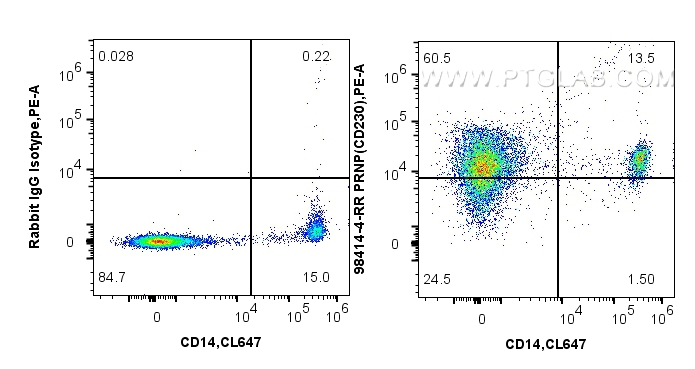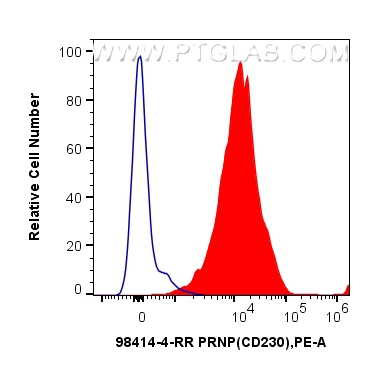验证数据展示
经过测试的应用
| Positive FC detected in | human PBMCs |
推荐稀释比
| 应用 | 推荐稀释比 |
|---|---|
| Flow Cytometry (FC) | FC : 0.25 ug per 10^6 cells in a 100 µl suspension |
| This reagent has been tested for flow cytometric analysis. It is recommended that this reagent should be titrated in each testing system to obtain optimal results. | |
| Sample-dependent, Check data in validation data gallery. | |
产品信息
98414-4-RR targets Prion protein PrP/CD230 in FC applications and shows reactivity with human samples.
| 经测试应用 | FC Application Description |
| 经测试反应性 | human |
| 免疫原 |
CatNo: Eg3359 Product name: Recombinant Human Prion protein PrP protein (rFc Tag) Source: mammalian cells-derived, pHZ-KIsec-C-rFc Tag: C-rFc Domain: 23-229 aa of BC012844 Sequence: KKRPKPGGWNTGGSRYPGQGSPGGNRYPPQGGGGWGQPHGGGWGQPHGGGWGQPHGGGWGQPHGGGWGQGGGTHSQWNKPSKPKTNMKHMAGAAAAGAVVGGLGGYMLGSAMSRPIIHFGSDYEDRYYRENMHRYPNQVYYRPMDEYSNQNNFVHDCVNITIKQHTVTTTTKGENFTETDVKMMERVVEQMCITQYERESQAYYQRG 种属同源性预测 |
| 宿主/亚型 | Rabbit / IgG |
| 抗体类别 | Recombinant |
| 产品类型 | Antibody |
| 全称 | prion protein |
| 别名 | Prion protein PrP, PRNP, PrP, Alternative prion protein, AltPrP |
| GenBank蛋白编号 | BC012844 |
| 基因名称 | PrP |
| Gene ID (NCBI) | 5621 |
| 偶联类型 | Unconjugated |
| 形式 | Liquid |
| 纯化方式 | Protein A purification |
| UNIPROT ID | P04156 |
| 储存缓冲液 | PBS with 0.09% sodium azide, pH 7.3. |
| 储存条件 | Store at 2 - 8°C. Stable for one year after shipment. |
背景介绍
The major prion protein (PrP), also known as CD230, is encoded by the prion protein-encoding gene (PRNP). PrP is widely expressed in a variety of tissues and is abundant in the nervous system and participates in neuronal growth and survival. PrP expression is strongly associated with immune infiltrating cells, immunosuppressive cell infiltration and immune checkpoint molecules. PrP is an immune-related prognostic marker that holds promise for predicting outcomes related to colorectal cancer immunotherapy.
实验方案
| Product Specific Protocols | |
|---|---|
| FC protocol for Prion protein PrP/CD230 antibody 98414-4-RR | Download protocol |
| Standard Protocols | |
|---|---|
| Click here to view our Standard Protocols |

